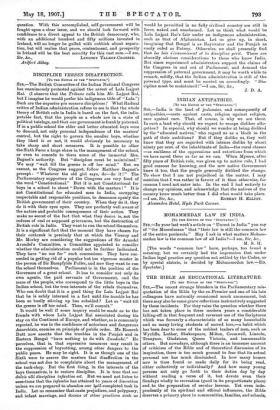DISCIPLINE VERSUS DISAFFECTION.
pro Tuu Emelt os TUU “Se5craroa.1
SIR,—The British Committee of the Indian National Congress has unanimously protested against the arrest of Lela Lajpat Rai. (I observe that the Tribune calls him Mr. Lajpat Rai, but I imagine he would prefer his indigenous title of "Late.") Such are the angustae pia munera disciplines! What Radical critics of Indian administration refuse to see is that the whole theory of British rule in India is based on the fact, the indisputable fact, that the people as a whole are in a state of political tutelage, and that our government is frankly paternal. If in a public school the elder and better educated, boys were to demand, not only personal independence of the masters' control, but the right to govern the smaller boys, whether they liked it or not, it would obviously be necessary to take sharp and short measures. It is possible to allow the Sixth Form a large share in the management of the school, or even to concede to them some of the immortal Mrs. Bagnet's authority. But "discipline must be maintained." We may "wait till the greens is off her mind." But we cannot, as the Congress suggest, follow Matthew Bagnet's precept "Whatever the old girl says, do—do it !" The Parliamentary supporters of the Congress are very fond of • the word "Constitutional," But it is not Constitutional for boys in a school to shout "Down with the masters !" It is not Constitutional for educated men in India, occupying respectable and responsible positions, to denounce openly the British government of their country. When they do it, they do it with their eyes open. They are perfectly well aware of the nature and probable consequences of their action. They make no secret of the fact that what they desire is, not the redress of real or supposed grievances, but the destruction of British rule in India. They want to run the school themselves. It is a significant fact that the moment they have chosen for their outbreak is precisely that at which the Viceroy and Mr. Morley are considering the suggestions of Sir Arundel Arundel's Committee, a Committee appointed to consider whether the administration could not be further Indianised. They have "no use for" such concessions. They have succeeded in getting rid of a popular but too vigorous master in the person of Sir Bampfylde Fuller, and now they want to run the school themselves. Parliament is in the position of the Governors of a great school. It has to consider not only its own agents, the paid servants of Government, and the mass of the people, who correspond to the little boys in the Indian school, but the true interests of the rebels themselves. Who can doubt that it is a good thing for Lela Lajpat Rai that he is safely interned in a fort until the trouble he has been so busily stirring up has subsided ? Let us "wait till the greens is off her mind. Then, we'll consult."
It would be well if some inquiry could be made as to the friends with whom Late Lajpat Rai associated during his stay on the Continent of Europe, and whether, as is commonly reported, be was in the confidence of notorious and dangerous Anarchists, enemies on principle of publics order. Mr. Romesh Dutt now asserts that the troubles in the Punjab and in Eastern Bengal "have nothing to do with Swedes/4.i." He perceives, that is, that repressive measures may result in the suppression of boycotting, among other dangers to the public peace. He may be right. It is as though one of the Sixth were to assure the masters that disaffection in the school was not due to complaints about the management of the tuck-shop. But the first thing, in the interests of the boys themselves, is to restore discipline. It is true that nec dulds will disciplina infantiae est. But we need not listen to assertions that the in/untie has attained to years of discretion unless we are prepared to abandon oar lialf-completed task in India. Let us remember that caste prejudices, and polygamy, and infant marriage, and dozens of other practices such as would be permitted in no fully civilised country are still in force, naked and unashamed. Let us think what would be Lida Lajpat Rai's fate under an indigenous administration, such as that of Afghanistan. Let us give up, in short, imagining that Bengal is as Bayswater and the Punjab as easily ruled as Putney. Otherwise, we shall presently find that les lois s'e'vanouissent et la discipline peril. These are absurdly obvious considerations to those who know India. But since experienced administrators support the claims of the Congress in and out of Parliament, and demand the suppression of paternal government, it may be worth while to remark, mildly, that the Indian administration is still of the paternal type, and must be carried on accordingly. "Discipline must be maintained !"—I am, Sit., &c., J. D. A.






































 Previous page
Previous page